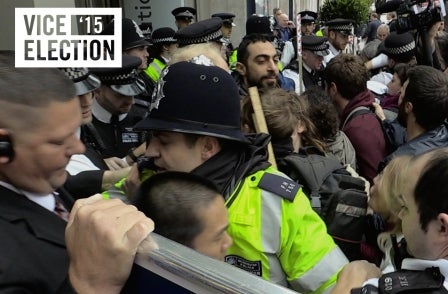
The forthcoming UK general election will see a new crop of online-only news websites make their presence felt for the first time.
Vice, Buzzfeed and Huffington Post all now have major UK online news operations that weren't around in 2010.

Vice UK launched a series of films in the run up to the election yesterday, promising to challenge the "dull stranglehold" of mainstream media coverage.
The website will release a series of short documentaries focusing on “societal and cultural issues affecting young people” rather than Westminster politics. The films are to be on housing, poverty, political disillusionment and young people’s relationship with the political system. These include three-part series Regeneration Game, which looks at London’s social housing.
Vice will also run a series of satirical videos by on-the-campaign-trail political correspondent Gavin Haynes.
Kev Kharas, VICE UK editor, said: "It’s going to be the most anarchic election in living memory.
"It would be a shame to have to cover it in the same grey, old boring way.”
Vice told the Press Gazette that one upcoming film will be on the community around a food bank in Newcastle, while another will centre on two young political hopefuls first seen in a documentary from 2010.
A Vice spokesperson said that a separate series of films on those in youth politics – from parliamentary candidates to fringe groups – will allow viewers to “see the current political climate through the eyes of young politics junkies.”
Shorter satirical films are to feature a student’s party in Manchester, a controversial underdog standing against Nigel Farage in South Thanet and a single-issue party fighting Dolphin massacres in Taiji bay, Japan.
Vice’s films are not bound by Ofcom’s requirements for political balance.

Deputy editor at Buzzfeed News Jim Waterson said that his website will also be taking a different approach to that of traditional media in the election.
“Stories have to be different, funny or shocking – if it is none of those then we won’t do it,” he said.
“There is not much point us writing up launches, set pieces, and party politics as there are other people doing this very well.
“We want the story behind the story.”
Waterson said that when Buzzfeed interviewed Prime Minister David Cameron two weeks ago, it was important to talk about serious issues, as well as looking for the less mainstream angles.
“In the David Cameron interview we asked him some fun questions in the final couple of minutes, but there’s no point interviewing the Prime Minister and asking him about his 12 favourite cats.”
The Telegraph noted that only around 10,000 watched the Cameron video interview live – but Waterson said it “wasn’t so much about watching live”, but about viewers seeing shorter shareable clips.
“People might not be interested in the full interview… it’s the little details that do really well online.
“The idea is not to have comprehensive coverage, but a selection of articles every day.”
He added: “It doesn’t matter to us if the tone is a bit uneven, as people are coming to stories from social media.”
While Vice may aim to focus on issues outside Westminster, Waterson said: “As we enter the final month there will be massive interest in straightforward parliamentary democracy.”

The Huffington Post is soon to launch its own election coverage.
Executive editor James Martin said: “At HuffPost, we want to go beyond the main themes of the election, such as the NHS and the economy.
“We will be launching a series soon that focuses around three other core issues that we believe are really important for the UK.
“As a digital platform, we want to make sure that everything we are doing engages audiences and encourages them to interact and share.
“We have some interviews, blogs, videos and roundtable discussions lined up, with MP's including Sarah Wollaston, David Lammy and David Davis, contributions from big thinkers like Alastair Campbell.
“I think political parties are still wary of digital media and see the potential for it to go wrong, rather something that can be a 'viral' success,” he added.
“The rise of Twitter has forced politicians to become more digitally literate, although scandals show they still have a long way to go.
“UKIP has advised against certain party members from using twitter, so we can see there still is anxiety and uncertainty.”
Email pged@pressgazette.co.uk to point out mistakes, provide story tips or send in a letter for publication on our "Letters Page" blog

